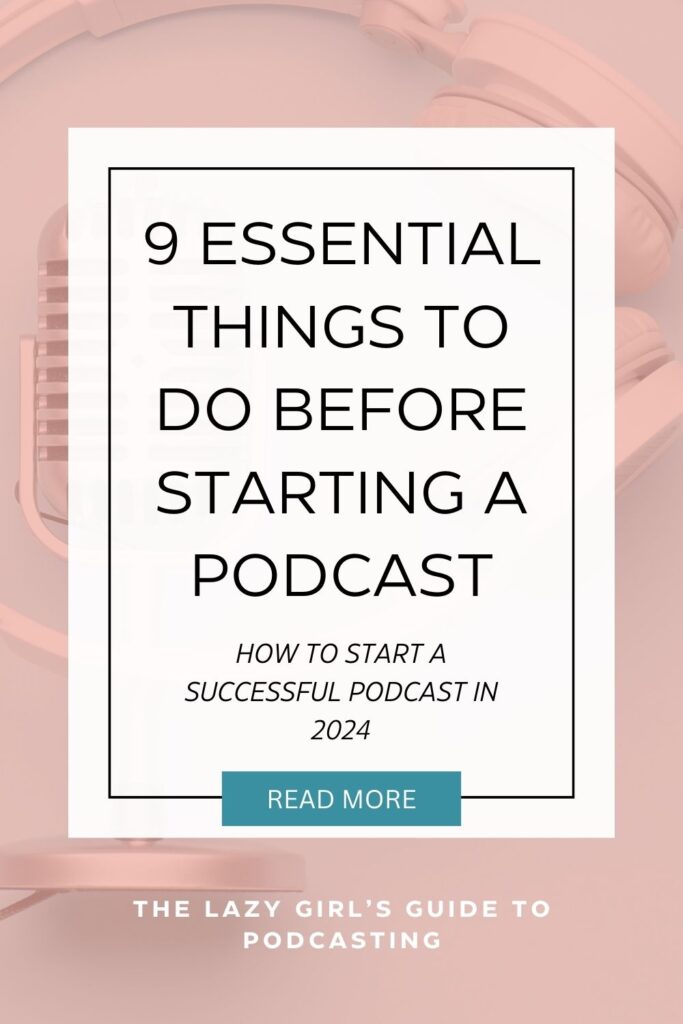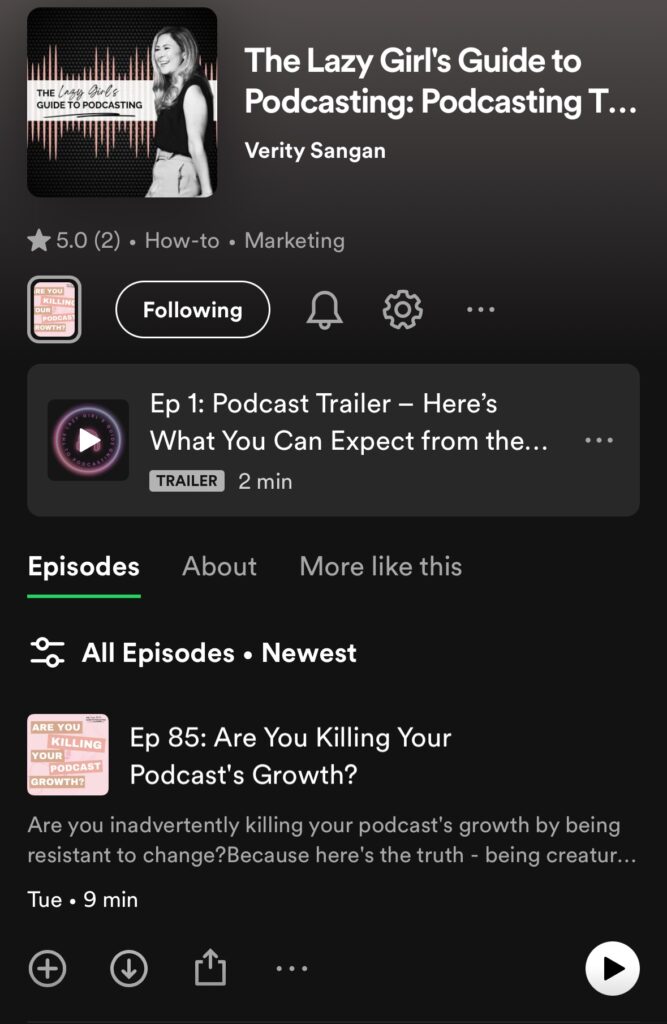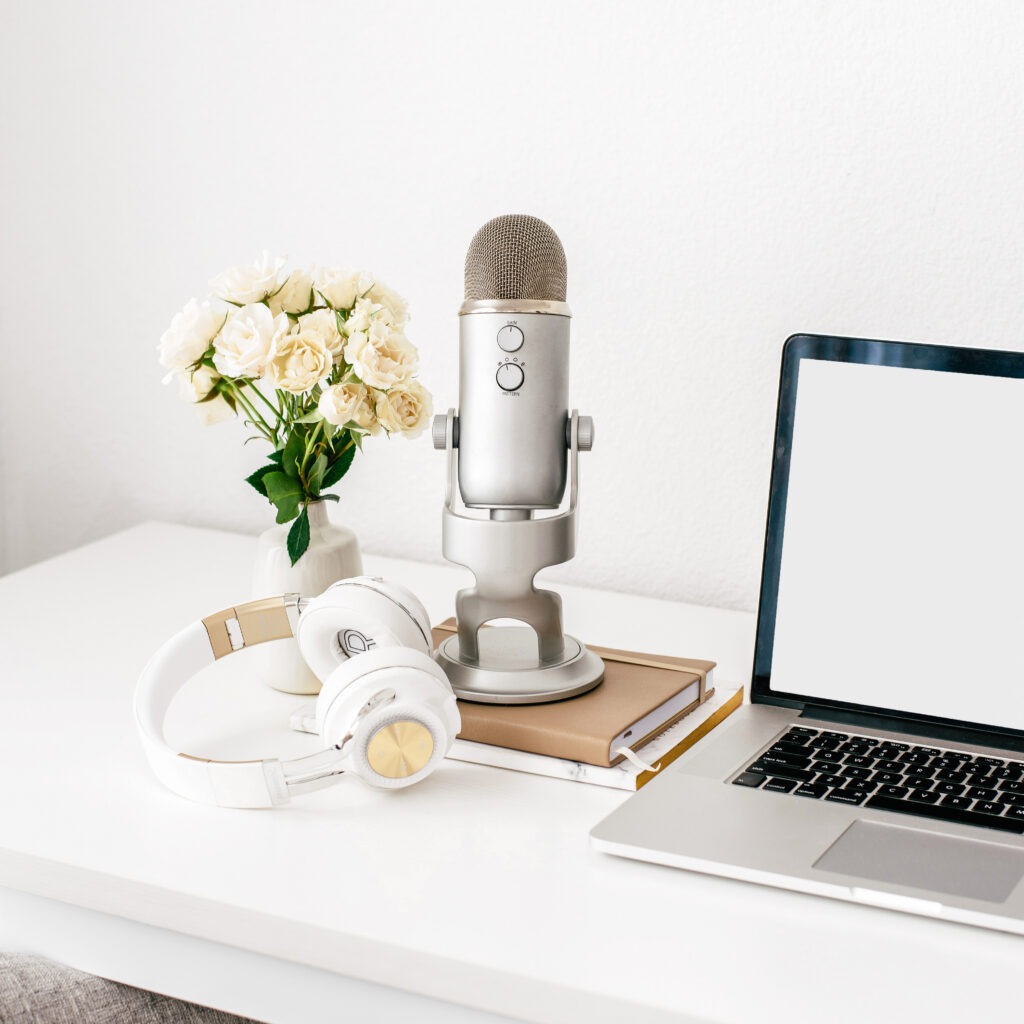Starting a podcast is high on the to-do list of so many creatives. Whether you’re a business owner looking to grow your authority, a blogger wanting to expand your audience, a YouTuber who wants to repurpose the audio of their videos onto a different medium, or any other reason that you can think of, podcasting is a fantastic medium to freely get your message across to your audience.
Table of Contents
But before you start recording your first episode, there are some essential things that you need to do first to ensure that your podcast gets off to the best possible start.

1. Decide what you want to podcast about
Top of the list of essential things to do before starting a podcast is deciding what it is that you want to podcast about.
This might sound like a bit of a strange thing to raise, but it’s important that you know exactly what your show is going to be about before you hit ‘record’ on your first episode.
For example, saying that you’re going to create a podcast about the Royal Family is a bit vague. Are you going to talk about the current Royal Family? The Royal Family since William the Conquerer? Will you talk about royal families outside of the UK? Will your podcast be fact based? A gossip narrative? Opinion-based?
You get the point, you need to figure out what it is that you want to podcast about.
Some people might think of this in terms of niching down. I’m not a massive fan of the word ‘niche’ because I think it gets overused and without much consideration. However, your show does need some focus or another, because if you don’t know what your show is about, how will you be able to promote it to an audience?
Related post >> What Should My Podcast Be About?
Related post >> Why Your Podcast Format Matters More Than You Think
2. Determine your motivation behind starting a podcast
Knowing the motivation behind your show is equally as important as knowing what you will be podcasting about.
Motivations to podcast will differ from podcaster to podcaster, but some motivations may include:
- Building your authority within a topic or niche (yes, I don’t like the word, but I still use it!)
- Selling products and/or services from your business
- To have a way of exploring a topic that interests you
- To share a passion or expertise you have on a subject with others
- Taking up a new hobby
What ever your motivation behind podcasting is, it’s important to identify what it is.
Why? Because if you are aiming to sell services through your podcast, then you’ll need to have strategied in place to see how effective your podcast is as a marketing vehicle. If your motivation is to build a community of like-minded people about a certain topic, you’ll need to be able to identify where and how is best for your marketing and promotional material to reach this intended audience.
Related post >> 4 Reasons Why Podcasting is a Must for Your Coaching Business
3. Plan out at least 20 episodes
Solid fact for you: 90% of podcasts don’t make it past episode 3. That’s right – of the 2 million+ podcasts out there, around 90% of them do not have more that 3 episodes.
That’s mind-blowing, right?
But what’s the cause for this?
In truth? A lot of it comes down to a lack of long-term planning. You see, setting up and launching a podcast is the fun bit. Newbie podcasters get excited about creating their trailer, setting up the tech, learning to edit, creating social media graphics and a podcast cover, that they forget about planning the content.
My top recommendations for any new podcaster, or anyone thinking of starting a podcast, is to list out at least 20 episode ideas ahead of recording anything. Why? A few reasons:
Reason 1: If you can’t list 20 episode ideas, you don’t have a show
Sounds harsh, I know. But if you can only come up with a small handful of episode ideas, then you’re going to struggle to produce content for your show. You’ll quickly use up your initial ideas and then not be left with anything for the future.
The result?
Podcasters then lose motivation because they don’t know what to record next. So they start skipping episodes. And before long, they haven’t produced an episode in so long that they fall into the category of the 90% of podcasters who don’t get past 3 episodes.
Reason 2: You’ve got back-up content
You might never use all 20 of your ideas from your initial brainstorm list. But, if you are ever stumped as to what to record for an episode, you’ve got a back-up list of ideas which means that you’ll never be scrabbling for content.
I do this myself and currently, I have a list of 70+ episode ideas. So, if I ever don’t have a fresh idea for an episode one week, I can simply look at my list and pick an idea off of that.
Also, a list of 20+ ideas means that you have content ideas for between 6-12 months, depending on your publishing schedule. (This is assuming that you put out a weekly episode, then you have nearly. 6 months’ worth of content; or if you produce bi-weekly episodes, then you have nearly 12 months’ worth of content!)
Related post >> Descript: The Audio Editing Tool Every Podcaster Needs
Related post >> How to Create a Podcast Intro
Related post >> How to Write Your Podcast Outro (+ 3 Free Templates)
4. Invest in a good microphone
I’m going to be controversial for a minute here and tell you that the microhpone that you need to get for your podcast does not need to be expensive, it does not need to be popular, and it does not need to have 100’s of features.
What it does need is:
- To fit your budget
- Your time to learn how to use it properly
When starting a podcast, so many new podcasters rush to Amazon, social media, and Google to immediately try and discover the BEST podcasting microphone.
But the truth is, this microphone doesn’t exist.
For example, you can have a $1,000 microphone which sounds rubbish because you haven’t learned how to use it properly or set up your recording environment to optimise your sound.
Equally, you can have a $100 (or less!) microphone which provides fantastic quality sound because you’ve spent longer than 5 minutes learning how to use it and testing out your recording environment to get the best audio output.
So, when I say ‘invest in a good microphone,’ I mean that you need to invest in a microphone that fits your budget and you will learn how to use optimally. I would never advocate that someone starting a podcast should max out their budget (or break the bank!) on a microphone. I know plenty of podcasters who make a full-time income on their show with a basic microphone that cost less than $90 on Amazon.
And if you need a personal recommendation, I have recorded my podcast on a Blue Yeti microphone for over 2 years. And I love it!
Related post >> The Best Budget-Friendly Podcast Microphone for Beginners
Related post >> How to Record Your Podcast Using a Microphone for iPhone
5. Find a podcast hosting platform
When starting a podcast, probably the number 1 thing you need is a podcast hosting platform. You see, a podcast hosting platform is where your podcast lives. Here, you will input all of your podcast’s information, including:
- Your podcast’s name
- Your name (as the podcast host)
- The podcast description
- Your podcast’s artwork
- Show notes
- Upload your new episodes
You can have the fanciest microphone and the most expensive recording and editing software known to humankind, but without somewhere to host your podcast, your show will never make it out into the big wide world.
Your podcast hosting platform is what talks to the different podcast directories (more on those in a minute). Once your podcast is set up on your host, it will give you an RSS feed. If you aren’t familiar with RSS feeds, think of it like a website address which will give a podcast directory all of the information needed to display your show.
Every time you upload a new podcast episode to your hosting platform, it will push this information along the RSS feed and your new episode will appear in the different podcast directories and be ready for your audience to listen to.
There are tonnes of podcast hosting platforms available to podcasters, from free options all the way up to options that’ll cost you $500+ per month.
When you’re starting out with your podcast, my recommendation is Captivate.fm. Captivate offers a tonne of amazing features to quickly help you set up and grow your podcast, including a podcast website, monetisation options from within the platform, integrations with apps such as Descript and WordPress, and so much more!

Related post >> Changing Podcast Host: How to Change Your Podcast Hosting Platform
Related post >> How to Name Your Podcast in 2024
6. Submit your podcast to as many podcasting directories as possible
A podcast directory is the place where your audience will listen to your podcast. Examples of podcast directories include Apple Podcasts, Spotify, Spreaker, Castos, Goodpods, and many, many more.
One of the biggest mistakes that new podcasters make is thinking that they only need to have their podcast on a couple of directories. Or that they only need to have their podcast on the directory that they themselves use to listen to podcasts.
Neither of these thought processes will serve you well.
My advice when choosing the podcast directories or your podcast to be on? Simple: don’t choose, just submit. Submit your podcast RSS feed to AS MANY directories that your podcast hosting platform will enable you to, and then whenever you come across a different directory, submit your RSS feed to them. You never know where your audience might be listening. Your biggest fan might listen on the most obscure directory ever.
Equally, in the last couple of years, we’ve seen big directory giants shut down (I’m thinking Stitcher and Google Podcasts here). So unless you’ve got a crazy, amazing reason to be on one podcast directory only (for example, you’re a major celebrity with a guarenteed podcast audience and an amazing exclusive deal that’ll set you up for life), your podcast needs to be everywhere. Trust me; it’ll help from a discoverability and audience growth point of view.
Related post >> How do I Get My Podcast on Apple Podcasts?
Related post >> How to Get Your Podcast on Apple Podcasts (iTunes)
Related post >> How to Get Your Podcast on Spotify: A Beginner’s Guide
Related post >> Podcast Distribution: Why Your Podcast NEEDS to Be Everywhere
7. Create a podcast trailer
Before you publish your first episodes, one of the things that needs to be at the top of your to-do list when starting a podcast is a show trailer.
Think of a podcast trailer like an advert for your show. What will your show be about? What will you be promising your audience? Why should they listen to the show once it goes live?
A cool thing about your podcast trailer is that it’s always available to your audience and new listeners to your show. And as your show evolves, moves into a new era or series, or you just feel your trailer needs an update, you can replace it at any point.

Here is a screenshot of Spotify in mobile view showing the podcast trailer at the top of the episode list when clicking onto The Lazy Girl’s Guide to Podcasting.
The trailer is marked as ‘TRAILER’ and is a great way for potential listeners to the show to get a flavour of the podcast before commiting to any episodes.
Remember, a podcast trailer isn’t just a one-time job when starting a podcast; you can update it at anytime to reflect the current content of your show.
When recording your podcast trailer, don’t forget to include a solid call-to-action telling listeners to subscribe to the show so that they’re the first to know when your first episodes drop!
8. Decide how you want to promote your podcast
Promoting your podcast is simple, right? You record your podcast, write some show notes and then promote it with some social media posts made on Canva, right?
Well, sort of.
You see, your promotion and marketing stragegy for your podcast needs to be more than just sticking any old social media posts up and hoping for the best.
For example, Adam from Podcasting Business School is a huge fan of promoting the hell out of your podcast for the first 72-hours of its release. His rationale is that this is when podcast directories are going to be considering how valuable your content is and whether to push it to more listeners (i.e., up in the charts!). Therefore, getting more ears on your new podcast episode is crucial and so the more buzz on social media, the better!
Check out the full interview that we had with Adam below:
But deciding how and where to promote your podcast can seem overwhelming. A few quick ideas for places to promote your new podcast might include:
- TikTok
- Instagram (reels, static posts, carousels)
- Facebook (including your personal feed, in a Group, or on a Page dedicated to your show)
- Twitter/X
- Quora
- Discord
- Patreon
- Email list
- Blog posts
And those are just some of the options available on the internet. If you have a localised audience, you might also want to consider local newspapers, magazines, or community notice boards.
Before you decide on exactly where to promote your podcast, here are two questions to consider first:
Where does your target audience hang out?
The first thing to consider when promoting your podcast is where your target audience hangs out.
For example, if there’s a large number of people who would be interested in your podcast over in a Discord server, then being part of that community might serve you better than promoting on Instagram. Equally, YouTube shorts might work better for reaching your target audience than promoting on Facebook.
It can be challenging to work out exactly where your podcast audience hangs out. And it might take a bit of trial and error to figure it out.
For example, I largely promote The Lazy Girl’s Guide to Podcasting podcast on Twitter. So much so, that I have two accounts to do so; @VeritySangan which is my personal account and I post the most, and @LazyGirlPod where I retweet some of the posts from my personal account and also sporadically put out original promotional content as well.
For me, promoting the podcast on Twitter has been hugely successful, much more so than Instagram. How do I know this? Because I use Google Analytics to track where listeners come from and how the are referred to the podcast. Also, when I stopped promoting my podcast on Twitter for 2 weeks, I saw a 78% reduction in podcast downloads. This is compared to when I haven’t promoted the podcast on Instagram for long periods of time and seen no difference in my podcast downloads at all.
This tells me one clear thing: Twitter is where my podcast audience hangs out over Instagram. It also tells me that I’m better at making content for Twitter, so with those two factors in mind, it makes sense that Twitter is part of my podcasting promotional strategy.
What kind of promotional content do you like to create?
Next, you need to consider which promotional strategies you enjoy. For example, it’s no secret that I’m not a huge fan of creating TikTok videos. In fact, I’d much rather write a 3,000 word-long blog post which is optimised for SEO to promote a podcast episode than to create a 3 minute TikTok video.
So because of this, I don’t promote my podcast on TikTok.
Why?
Because I simply don’t enjoy creating content for the platform. I’d much rather put my energy into creating content that correlates with my own interests and strengths then wasting time on a strategy that I don’t enjoy (and therefore don’t create amazing content for!).
A final thought for promoting your new podcast show
And on that point, remember that you do not need to promote your podcast everywhere. As an indie-podcaster, it’s easy to compare yourself to shows who promote themselves on every single social media platform and pull in hundreds of thousands of downloads each month. But you aren’t these pocasts.
Quite often, these shows are supported with huge budgets, and with that, able to hire people who specialise in creating content for different social media platforms.
Related post >> How to Use TikTok to Promote Your Podcast
Related post >> How to Grow Your Podcast Audience: And the 3 Ways You’re Probably Killing It Without Realising
9. Tell everyone about your podcast!
When you first launch your podcast, you might not want to tell anyone about it.
What if your show is rubbish?
What if no-one listens?
What if people laugh at you?
Let’s break these 3 points down.
First of all, every indie podcaster thinks that the first few episodes of their podcast are rubbish
And in some ways, they’re supposed to be. That’s how you learn the craft of podcasting. Without the early episodes, how will you ever improve? Even though The Lazy Girl’s Guide to Podcasting is my second podcast (and I’d been podcasting for over a year by the time I launched that show), I still cringe at some of my earlier episodes because I was still finding my groove with that particular show.
Next, what if people laugh at you?
This is a very legitimate concern for anyone starting a podcast. And in my experience, this doesn’t happen very often at all, if ever. If anything, people are often in awe when they hear that someone has a podcast. ‘How do you fit that in?’ and ‘I wish I could do something like that,’ are phrases that I often hear when I tell people that I’m a podcaster. So hold your head high and don’t be afraid of telling people about your podcast. They might just turn into your biggest fans!
Finally; what if no one listens?
When starting a podcast, I beg you not to go into the project with the mindset that no one will listen. This type of mindset will mean that you won’t produce your best content, which in turn will turn off potential listeners. And whilst we’re on the subject of ‘no one will listen;’ do you mean that you’re worried that your listener count will actually be ‘0,’ or that it’ll just be lower than the millions of listeners you originally hoped for?
Remember that there’s a lot that goes into creating a successful podcast, and having a huge listenership and download numbers isn’t always the best way of determining success. After all, would you rather have 1,000 people listen to an episode for 5 seconds before switching to something else, or 30 people listen to 95% of your episode and engage with your call to actions and be active members of your community?
This post may contain affiliate links. If you click on an affiliate link and make a purchase, I may earn a small commission at no additional cost to you. For more information, see our Privacy Policy.





